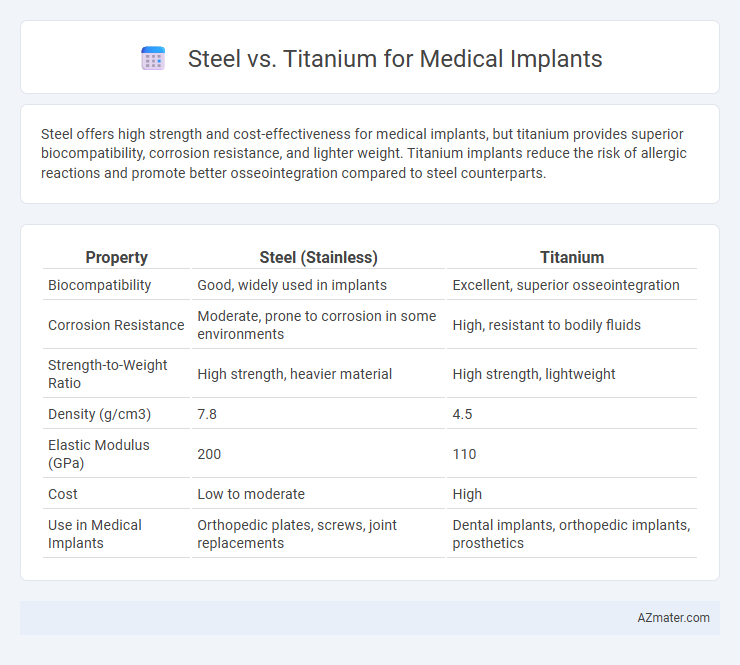Steel offers high strength and cost-effectiveness for medical implants, but titanium provides superior biocompatibility, corrosion resistance, and lighter weight. Titanium implants reduce the risk of allergic reactions and promote better osseointegration compared to steel counterparts.
Table of Comparison
| Property | Steel (Stainless) | Titanium |
|---|---|---|
| Biocompatibility | Good, widely used in implants | Excellent, superior osseointegration |
| Corrosion Resistance | Moderate, prone to corrosion in some environments | High, resistant to bodily fluids |
| Strength-to-Weight Ratio | High strength, heavier material | High strength, lightweight |
| Density (g/cm3) | 7.8 | 4.5 |
| Elastic Modulus (GPa) | 200 | 110 |
| Cost | Low to moderate | High |
| Use in Medical Implants | Orthopedic plates, screws, joint replacements | Dental implants, orthopedic implants, prosthetics |
Introduction to Medical Implants
Medical implants are critical devices used to replace or support damaged tissues and organs, requiring materials with high biocompatibility and mechanical strength. Steel, primarily stainless steel, offers excellent durability and corrosion resistance, making it a traditional choice for temporary implants and orthopedic supports. Titanium is favored for permanent implants due to its superior biocompatibility, lightweight nature, and resistance to corrosion, promoting better integration with bone and minimizing rejection risks.
Overview of Steel and Titanium Alloys
Steel alloys, particularly stainless steel 316L, are widely used in medical implants due to their excellent mechanical strength, corrosion resistance, and biocompatibility, making them suitable for load-bearing applications like bone plates and screws. Titanium alloys, especially Ti-6Al-4V, offer superior biocompatibility, high strength-to-weight ratio, and corrosion resistance, promoting osseointegration and minimizing titanium allergy risks. Both materials are critical in implantology, with steel favored for cost-effectiveness and titanium preferred for long-term implant performance and weight-sensitive applications.
Biocompatibility: Steel vs Titanium
Titanium offers superior biocompatibility compared to stainless steel, as it forms a stable oxide layer that prevents corrosion and reduces allergic reactions in the body. Stainless steel, while cost-effective and strong, may release metal ions that can cause inflammation or hypersensitivity in some patients. Due to its excellent osseointegration properties and lower risk of rejection, titanium is often preferred for long-term medical implants.
Mechanical Strength and Durability
Titanium offers superior mechanical strength and corrosion resistance compared to steel, making it ideal for long-term medical implants. Steel, while strong and cost-effective, is more prone to corrosion and fatigue over time, potentially compromising implant durability. The biocompatibility and lower density of titanium contribute to enhanced implant longevity and patient comfort in orthopedic applications.
Corrosion Resistance in the Human Body
Titanium exhibits superior corrosion resistance in the human body compared to steel, forming a stable oxide layer that protects against biofluids and bodily acids. Stainless steel, while commonly used, is more susceptible to corrosion and ion leaching, potentially leading to inflammatory responses. This inherent corrosion resistance makes titanium the preferred material for long-term implants such as joint replacements and dental implants.
Implant Longevity and Performance
Titanium implants exhibit superior biocompatibility and corrosion resistance compared to steel, enhancing implant longevity and minimizing the risk of inflammatory responses. Steel implants, particularly stainless steel, offer high mechanical strength but are more susceptible to corrosion and metal ion release, potentially compromising long-term performance. The osteointegration capability of titanium supports stable bone-implant interfaces, promoting durable function and reducing implant failure rates in medical applications.
Imaging Compatibility (MRI and X-rays)
Titanium implants exhibit superior imaging compatibility compared to steel, causing fewer artifacts and distortions in MRI and X-ray scans due to their non-ferromagnetic nature and lower density. Stainless steel implants, being ferromagnetic, often interfere with MRI quality, generating significant image artifacts that can obscure diagnostic details. Titanium's biocompatibility and minimal signal disruption make it the preferred choice for medical implants requiring frequent imaging evaluations.
Allergic Reactions and Patient Safety
Titanium exhibits superior biocompatibility and lower allergenic potential compared to stainless steel, making it the preferred choice for medical implants to minimize allergic reactions. Stainless steel contains nickel and other metals that can trigger hypersensitivity in some patients, posing risks to implant integration and safety. Clinical studies confirm titanium's inert nature reduces immune responses, enhancing patient outcomes and implant longevity.
Cost Comparison: Steel versus Titanium
Stainless steel implants typically cost significantly less than titanium implants, making them a more budget-friendly option for medical procedures. Titanium's superior biocompatibility and corrosion resistance justify its higher price, often doubling or tripling the cost compared to steel. Hospitals and patients must weigh cost savings against long-term benefits when choosing between stainless steel and titanium implants.
Choosing the Right Material for Medical Implants
Selecting the right material for medical implants depends on factors like biocompatibility, strength, corrosion resistance, and weight. Titanium offers superior biocompatibility and corrosion resistance, making it ideal for long-term implants, while steel provides greater strength at a lower cost but may risk corrosion and allergic reactions. Evaluating patient-specific needs and implant location is critical to optimize performance and minimize complications in medical implant selection.

Infographic: Steel vs Titanium for Medical Implant
 azmater.com
azmater.com